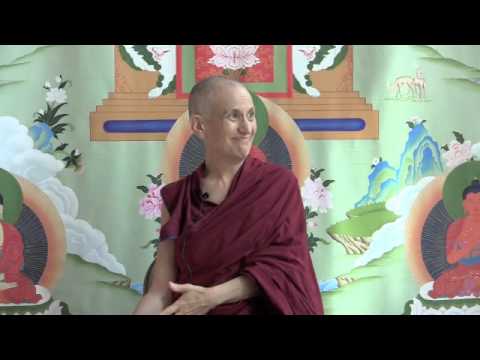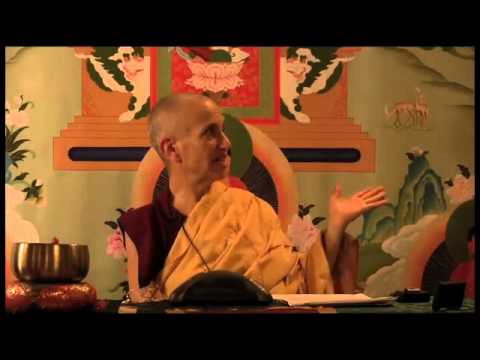The four opponent actions for healing broken trust
Part of a series of short Bodhisattva's Breakfast Corner talks on the topic of trust.
- Regret is the primary thing when we’ve done something we don’t like
- Restoring the relationship entails changing our attitude towards those we’ve harmed
- Examining the mental state that led us astray can help us to not repeat the action
The four opponent actions for healing broken trust (download)
I want to talk a little more about the four opponent powers and how to use them to purify ourselves when we notice that we’ve acted in a way we don’t like, that has created negative karma and that has broken trust.
Regret
First, regret is the primary thing, not guilt, not beating ourselves up—that doesn’t do any good. Certainly, regretting whatever actions we did out of attachment or anger that broke the trust, and then restoring the relationship.
Restoring the relationship
This is the challenging one in a situation of breaking trust, because first we have to restore the relationship within ourselves, and then we have to see if we can restore it with the other person or not. From a Buddhist viewpoint, the important thing is restoring the relationship within our own mind. Actually, we need to restore the relationship—in this case that I was talking on, of somebody cheating on their partner—you have to restore the relationship with yourself, you have to restore it with your partner, and you have to restore it with the person who was the other one. That’s the whole thing about cheating in relationships, is that it gets so many people involved. If you have children, then you have to restore the relationship with them. If you have other family members who are influenced, you have to restore the relationship with them. Same thing in an office situation, if there was broken trust, you may have to restore the relationship with your boss, with your colleagues, with your employees. There are a number of people that are involved.
Changing our attitude towards the others
The principal thing that we have to do is to change our attitude towards the minds of the people with whom we acted in an irresponsible way. In the case here of somebody cheating on their partner, you generate love and compassion for your partner. Not attachment, but genuine love and compassion that wants them to be happy and free of suffering. Whether they receive that happiness and freedom from suffering dependent on you or not, you really wish them well.
Then you also have to change your attitude towards the person who was the other one who you were cheating with, and cut the attachment to that person, and also realize that that person’s going to be suffering. In this case it was a man’s attention split between his wife and the other woman, then both of those people in the end are going to suffer. When I mention this other situation where the families have children, it even gets more complicated because the wife’s going to suffer, the other woman’s going to suffer, and the kids are going to suffer. You have to change your attitude towards all three of them, because it’s not like the other woman is going to say, “You want to go back to your family? Fine! It’s okay with me, my feelings aren’t hurt!” No, she’s not going to say that. She’s going to be devastated, in the same way that the wife was devastated. Through somebody’s following their attachment without really thinking of the effects of their actions on other people.
You have to have a sense of regret for the harm caused to all those people, and then really change your attitude towards them. Instead of having attachment, or aversion, or whatever you’re having, to really wish them well, and to wish them happiness and freedom from suffering. Like I said, not because they’re the people you happen to be attached to, but because they’re human beings. This is especially true because the wife might be mad at you, the other woman might be mad at you, kids might be mad at you, and the relatives, the boss, colleagues, who knows who’s going to be mad at you? From your side, to have an attitude of really wishing them well, not blaming yourself for their unhappiness, but taking responsibility for your own actions that were negligent.
Trying to make amends
Then, trying to make amends to these people as best as you can, and that’s the part that’s really going to take a long time. Trust takes a long time to build up, and very little time to abrogate. Doesn’t it? It’s like our garden growing, it takes a long time for the fruits and vegetables to grow, and it only takes one minute to take it down and eat it. The same kind of thing there. That’s going to be done over being careful of one’s behavior over a long period of time, really looking at the state of your mind and how you’re acting towards the various people involved.
In terms of what’s going to happen—the man’s going back to his wife and his family, what happens with the other woman? It’s very tempting for him to feel, “Her feelings are so hurt by me going back to my family, that I have to just spend a little bit more time with her so she doesn’t feel so hurt and so devastated because I’m going back to my wife.” That’s excuse number 7953 of why I’m not leaving her. If you’re really going back to your family, if you’re going back to your primary relationship, you have to clean cut the relationship with the other person. They may be hurting, they may need comfort and support, but you are not the person to give it to them. They need the comfort and support of other people who they can really trust, because they no longer trust you either. Breaking trust really creates a mess. Especially in marriage relationships and community relationships where people are really close to each other, really creates such a mess, doesn’t it? That person needs help and support, but you’re not the one to give it to them, and it’s much kinder to just cut the relationship and not have contact. It’s easier on the person who you’re leaving, and that is going to be a major factor in regaining the trust of your wife.
Here it’s the husband who’s been cheating, as in the cases that have come to me, that’s what it is. It could be the wife who’s been cheating too. If you really want to re-establish the relationship with your spouse, then you have to cut the relationship with the other person, and slowly reestablish trust, and come back, and start developing good conversations, and start sharing things with your spouse or your partner, to develop that relationship and rebuild the trust and the confidence in each other.
Determination not to repeat the action
Then you have to make the determination never to do the behavior again, so that’s where cutting the relationship with the other person is really important. Not only saying, “I’m not going to see that person again,” but, “I’m not going to stray from my marriage again,” or “I’m not going to break the trust of the community again,” and so making some kind of strong determination to avoid that kind of action in the future. The only way we can really make a strong determination not to do it again is by having regret, and then also by really practicing the thought training practices, so that we can overcome the attachment or the anger that made us break the trust to start with.
Just saying, “I regret doing that and I’m not going to do that again,” it isn’t necessarily going to give us the strength of mind to not follow the attachment and the anger in the future. We have to really look closely, “What was my mental state and how did the attachment work in it? How did the anger work in it? How did I get to the point where I no longer had a sense of integrity or consideration for others? How do I build up my mindfulness, my introspective awareness?” Let’s do some meditation to develop my sense of integrity and my consideration for others. Actively thinking about how to handle that mental state or that temptation, should it arise again, because it probably will! Won’t it? These kinds of things happen all the time. That’s why we need to be prepared beforehand.
Consideration for others
In this way, I find it helpful to kind of reflect on your whole life. Like, if you want to develop the sense of consideration for others, to really think deeply about what has been the effect of my actions on other people, and am I happy with that effect? When I think about the kindness that other people have shown me, do I want to continue behaving that way? So to really go deep in our own mind, to re-train the mind and develop good antidotes to this kind of thing. The next time an attractive person appears, it’s not that, “I’m just going to be her mentor,” or, “We’re just going to have friendly lunches as colleagues.” It’s like, “I know what attachment feels like in my mind, and I am not biting the hook.” We know when attachment comes in the mind, don’t we? We just don’t like to acknowledge that’s attachment. We would much rather say, “It’s a special relationship.” Right? Well it is, it’s a special relationship with a lot of attachment! So being able to recognize that and have some strong determinations in place.
Remedial antidote
The fourth of the four opponent powers is the remedial antidote. Doing Vajrasattva meditation, doing the prostrations to the 35 Buddhas, things like that where again, you’re really contemplating the state of mind that got you into the mess, and how you’re going to avoid it in the future. How else you could think, how else you could act when that situation happens again, then doing the Vajrasattva, the 35 Buddhas, or, in the case of a marriage, the remedial action is how you act day to day in relationship to your spouse. It’s not that you do a lot of Vajrasattva meditation, but you’re still looking at everybody else. That’s not going to work. Or it’s not that you do Vajrasattva meditation, but you don’t make an effort to do fun things with your spouse, to re-establish good communication, or to listen deeply to what’s going on with that person.
No, you have to do something in a day-to-day life, to show that person you are trustworthy. The same in an office relationship or working relationship or in a community relationship like we have. You have to do something day by day, so that people can see that person’s word can be trusted. They say they’re going to do this, they’re doing this. They say they’re not going to do that, they’re not doing that. What do they say? Our actions are the proof of the pudding? Something like that? Anyway, there’s a lot of sayings about that. Oh, actions speak louder than words. That’s what we have to do for the remedial behavior part of it.
Venerable Thubten Chodron
Venerable Chodron emphasizes the practical application of Buddha’s teachings in our daily lives and is especially skilled at explaining them in ways easily understood and practiced by Westerners. She is well known for her warm, humorous, and lucid teachings. She was ordained as a Buddhist nun in 1977 by Kyabje Ling Rinpoche in Dharamsala, India, and in 1986 she received bhikshuni (full) ordination in Taiwan. Read her full bio.


